5. Undergraduate category archive
How to Ensure That College is a Good Investment 0
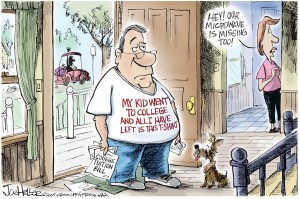 When the high school Class of 2026 becomes the college Class of 2030 as freshmen in college, the College Board continues to support the belief that earning a college degree now is more important than ever in the global economy. A typical bachelor’s degree recipient, they claim, earns 80 percent more than a high school graduate over a 40-year career, amounting to more than $500,000 over a lifetime. That financial incentive has resulted in an enrollment surge for American colleges and universities in the past decade.
When the high school Class of 2026 becomes the college Class of 2030 as freshmen in college, the College Board continues to support the belief that earning a college degree now is more important than ever in the global economy. A typical bachelor’s degree recipient, they claim, earns 80 percent more than a high school graduate over a 40-year career, amounting to more than $500,000 over a lifetime. That financial incentive has resulted in an enrollment surge for American colleges and universities in the past decade.
In addition, since 1990, supply and demand and increased Federal Aid loan and grant programs (for the poor) have allowed colleges to continue raising tuition and fees faster than inflation. (Grove City College is a prime exception.) This has stretched parents’ budgets, with incomes ranging from $100,000 to $350,000, to save even enough to cover one or two years of college costs. In past posts, I discussed why college is so expensive.
When the financial bubble burst because of lack of oversight of investment banks in 2008, average college costs in the U.S. consumed some 40 percent of median earnings in the United States, up from less than a quarter of income eight years earlier.  Now, as students and parents have fallen prey to the student loan scam, debt has surpassed more than $1 trillion, and parents are asking what they were getting in return for the high cost of a college degree. While the value of higher education in preparing for a career continues to be the big selling point in promoting college, prospective students and their parents are beginning to cast doubt on the return on investment of certain majors and particular colleges.
Now, as students and parents have fallen prey to the student loan scam, debt has surpassed more than $1 trillion, and parents are asking what they were getting in return for the high cost of a college degree. While the value of higher education in preparing for a career continues to be the big selling point in promoting college, prospective students and their parents are beginning to cast doubt on the return on investment of certain majors and particular colleges.
In response, many colleges, like Lafayette and High Point University, are focusing even more on their students’ outcomes and putting in place programs to prepare their undergraduates for the job market better. In an extensive survey of college leaders conducted by The Chronicle of Higher Education in the fall of 2014, six in 10 reported increased discussions about job preparation for their graduates in just the past three years. The survey, completed by some 800 vice presidents, deans, and directors at two-year and four-year colleges, focused on their attitudes about the value of their degrees, strategies to measure the outcomes of their graduates, and what skills higher education should provide to students.
President Obama used the annual address to announce new higher-education proposals that did not bring joy to college administrators who wanted more federal dollars for student aid. But on this night, the president was not to announce any new federal investment in higher education. Instead, he said his administration would release a new College Scorecard that parents and students can use to compare schools based on a simple criterion: where you can get the most bang for your educational buck.
Now, a government tool (and additional layers of costly, redundant bureaucracy) would turn college into a product to compare in the same way consumers size up cars or televisions in Consumer Reports. The more things that change, the more they stay the same. Everyone wants to protect what they have, mainly if what they have is a cash cow.
Working with students with college aspirations, we show them the value of following steps that will lead to the outcomes they want. One of those steps is helping them discover what they want, and another is helping them understand the financial ramifications of those decisions.
 While colleges and universities attempt to redefine their approaches to measuring student outcomes after graduation, we show families how to do their due diligence in estimating the merits of colleges by asking good questions and applying good old, albeit rare, critical thinking.
While colleges and universities attempt to redefine their approaches to measuring student outcomes after graduation, we show families how to do their due diligence in estimating the merits of colleges by asking good questions and applying good old, albeit rare, critical thinking.
It all starts with a complimentary get acquainted, no obligation conversation with us at (978) 820-1295. Simple postgraduate surveys are not enough for many prospective parents and students. However, there are proven methods to prepare students for the job market and measure their success long after graduation.
Good News for the Undergraduate 0
For 30 years, I have been encouraging college students to take full advantage of their college’s advising services. (Get your gift below.) This includes professor mentoring, internships, and the Career Planning Services office. One does not have to look very far to learn that many college graduates are leaving college with student loans and few job prospects, much less any related to their chosen major.
Over the last four years, we have had challenges stemming from the global pandemic that put a strain on the economic systems world wide. What was not understood is that over 98% of healthy humans are either immune or can recover with by following simple health regimes and gain an understanding of the innate power of the human immune system. Hopefully, if you a student with aspirations to become a doctor or nurse you will be required to study text books like this. Pandemics have occurred over the years; remember this one? I have been a lifelong proponent of teaching the values of Naturopathic and Allopathic methods toward achieving wellness. In the ER, for example, the latter’s procedures would be more important than the former. I encourage everyone to do their due diligence in understanding the principles and steps toward achieving and maintaining optimal health. I have been giving easy to digest (pun intended) seminars this past year teaching those steps. Thankfully, it is not rocket science. Call me at (978) 496-7462 for the books and simple methods, I recommend to students and adults to learn how to strengthen your immune system. Now, back to more good news!
 It is encouraging to see more colleges proactively taking their role as advisors. For instance, look at Lafayette College’s website. They start preparing students when they are freshman. In addition it will open their books to prospective students with information about what past graduates have been able to accomplish.
It is encouraging to see more colleges proactively taking their role as advisors. For instance, look at Lafayette College’s website. They start preparing students when they are freshman. In addition it will open their books to prospective students with information about what past graduates have been able to accomplish.
If you are a recent graduate or parent considering doing something new, here are two resources I can confidently recommend. They can work with you wherever you call home. 🙂
1. Kim Meninger, MBA, a very intuitive Executive Coach and Career Strategist. Take your first step here.
2. Joanne Meehl Career Services offers terrific tips on her Blog and one-on-one counseling. She offers a plethora of resources and personal insight from her her years of experience in both counseling and networking, regardless of your age. Sign up today for her newsletter.
If you are a college student, how much research into the advising and internship options have you done? If little, familiarize yourself with the career services office, even if you are a freshman. By the way, one student who took interning VERY seriously turned her experience into a business. Meet Lauren Berger, the InternQueen.
Once you have successfully navigated the first year and know what is expected academically, it is time to get serious and consider why you are in college.
The passing of Steve Jobs reminded me of his 2005 graduation talk to Stanford graduates. It is undoubtedly one of the finest commencement speeches ever delivered in history! Here is the life-changing message. Think about what he said. For me, it was one of the most insightful and spiritually aware statements of purpose I have ever heard. Let me know what you think.
Speaking of “insightful,” if you have done your four (4) insightful self-assessments with us, do not forget they reveal within them a rich resource of career descriptions and academic concentrations that match up to your natural strengths and innate characteristics that will comprise your personality for your life on this planet we call Earth!
It will be at your fingertips for years to come. Take advantage of that. If you have not bookmarked the link, I will send you the link. In addition, if you have any questions regarding your choice of major, send me an email ~ help@SmartCollegePlanning.org
Finally, for all undergrads (or recent grads) who complete our undergraduate survey here by August 31, 2025, I will send you a book of paramount importance, whatever your major. I look forward to hearing how you are doing soon.
Crossing the Gap ~ Preparing for the Transition 0
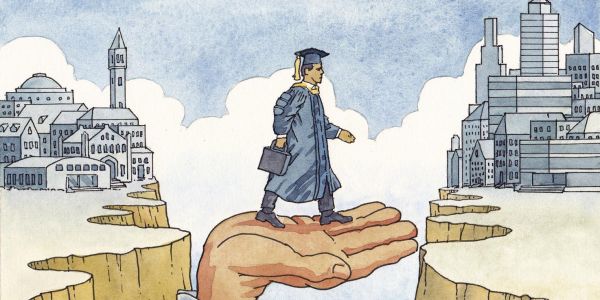 In the post WW II era of the early 50’s there were approximately 3 million college students; now there are 20 million. A college degree which used to be seen as a luxury, something which would, in a lifetime, enrich and enlighten….is now seen as a ticket to a bigger paycheck. Colleges, supported by the College Board and politicians in the District of Columbia, continue to say that a Bachelor degree is worth over 1.3 million dollars more in earnings than a high school diploma. Look at the report published by Georgetown University’s Center on Education and the Work Force.
In the post WW II era of the early 50’s there were approximately 3 million college students; now there are 20 million. A college degree which used to be seen as a luxury, something which would, in a lifetime, enrich and enlighten….is now seen as a ticket to a bigger paycheck. Colleges, supported by the College Board and politicians in the District of Columbia, continue to say that a Bachelor degree is worth over 1.3 million dollars more in earnings than a high school diploma. Look at the report published by Georgetown University’s Center on Education and the Work Force.
 But now we hear that the undergraduate degree is not enough and that an increasing number of graduates are unemployed or underemployed. If that is true, why is it true?
But now we hear that the undergraduate degree is not enough and that an increasing number of graduates are unemployed or underemployed. If that is true, why is it true?
- Are employers raising the proverbial bar for advancement or even entry level jobs within the organization?
- Is it because colleges are graduating students with little more knowledge or critical thinking skills than they had in high school ?
- Or is it because college graduates are not prepared to enter the work force because they have had little or no substantive work experience while they were college students?
- I once interviewed a Harvard Economics graduate for a position in the financial firm I worked for in NYC. I asked him if he was familiar with the “Rule of 72“? He never heard of it. All of our students learn this before they finish high school. If you are earning money now or just graduated from college, here is a firm I trust to help you become financially comfortable earlier than later.
Many would blame the “economy”. Yes, we hear a lot in the news about jobs being scarce for a variety of reasons. But why have we not been taught that in high school? I suggest it is because our Keynesian economic system, based on creating money our of thin air resulting in monumental debt, has been subtlety used to manipulate trends of booms and busts in the economy since 1913 and was accelerated in 1971 when the dollar was taken off the gold standard. Currently, college graduates particularly those with inadequate knowledge of economic, political and cultural history are challenged. Many have not done the introspective thoughtful goal setting prior and during college. Part of that is because of guidance from well meaning teachers and counselors who went through the same type of education the student has. Often unintentional but a lack of focus and understanding of a teenagers innate characteristics and natural strengths. Many are graduating without substantive “real world” internship experiences continue be challenged finding good jobs. But of course, what is a good job for one person is terrible for another.
Despite that reality check, there is good news for the undergraduates here. 🙂
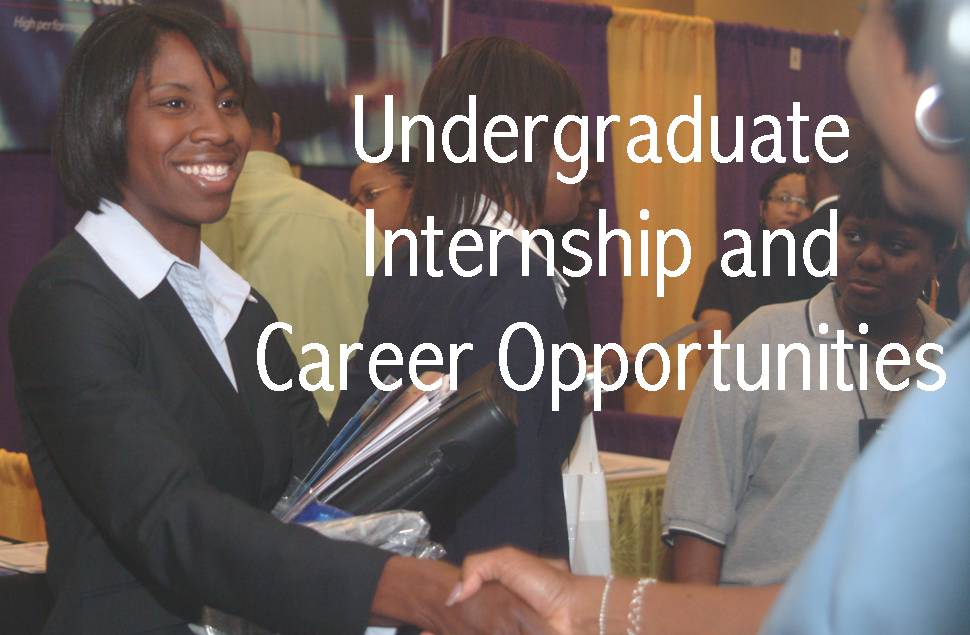 Newly minted college graduates (and parents) have made significant down payments on their futures in terms of both time and money, and they typically have a considerable burden of debt right out of the gate. If that graduate did not investigate the career services department beginning in the freshman year (preferably when they were still in high school) he or she may have missed getting the internship or co-op experience needed to optimize their job prospects.
Newly minted college graduates (and parents) have made significant down payments on their futures in terms of both time and money, and they typically have a considerable burden of debt right out of the gate. If that graduate did not investigate the career services department beginning in the freshman year (preferably when they were still in high school) he or she may have missed getting the internship or co-op experience needed to optimize their job prospects.
If you are an undergraduate now or thinking about going to college, look around your community. Is there something you see that is being done by someone that not only looks interesting but enjoyable and…dare I say fun? Though you may not be able to tell at first, are they earning an income that supports their life style?
Take an honest assessment of your natural strengths and innate characteristics. (If you have done that work with me already, return to the computer where you have made it a favorite.) Research that work that looks like fun and learn what it will take to do it. By the way, did you know that the best definition of work is NOT in the dictionary? Here it is.
Work (wurk) n. ˜something you do when you would rather be doing something else”
Is that a Utopian ideal? Not necessarily.
If you are a whiz in math or science that does not mean you should be an engineer, mathematician or doctor. Your peers, relatives and teachers may say so, and they may be right. But I don’t have enough fingers and toes to count the number of adults I know who are now self-employed with time freedom to spend doing things they never dreamed they could do and spend time with their families all while writing their own paycheck. The work they are doing may even be unrelated to what their college major was. Learn from the learning curve of adults and college students like these who have walked the path ahead of you and changed their destinies by focusing on doing, not wishing.
If you cannot find your dream job why not create one! As a matter of fact, forget about a job for a moment. After all, did you know that the word “JOB“ is an acronym for Just Over Broke. (Particularly if you do not implement the “Rule of 72” as soon as you begin earning an income.) Jim Rohn, the late great business philosopher and mentor for millions of successful entrepreneurs said, “Formal education can help make you a living, but self-education will make you a fortune.”
He was a master with words and ‘walked the talk’ by doing. We ALL have the ability to change, but as Jim Rohn said in another memorable quote, “If you really want to do something, you will find a way; if you don’t you will find an excuse. If you would like some help or simply assurance that you are on the right track, give us a call. No more excuses. 🙂
Eric Goodhart ~ (978) 820-1295
A History Lesson 0
“You cannot solve a problem with the same thinking that created the problem.”
 That quote has been attributed to Albert Einstein. I am unsure in what context he said that, but a lesson could be learned regarding the decades of escalation of national debt, not just individual debt. One does not have to look far to recognize there is a problem. To solve the problem, therefore, we must NOT rely on the same thinking of the people (or institutions) who created the problem.
That quote has been attributed to Albert Einstein. I am unsure in what context he said that, but a lesson could be learned regarding the decades of escalation of national debt, not just individual debt. One does not have to look far to recognize there is a problem. To solve the problem, therefore, we must NOT rely on the same thinking of the people (or institutions) who created the problem.
When the world was getting back on its feet following World War II, the US economy expanded. As in WWI, our nation was not subject to the civilian deaths and property destruction in Europe, Asia, and elsewhere. We were seen as the leaders of the Western world.
In July 1944, delegates from 44 countries met at the Mount Washington Hotel in Bretton Woods, New Hampshire, to set monetary policy for the “civilized” world. The delegates agreed upon a policy that set the US dollar (backed by gold and silver) as the standard for world currency. From that event came the International Monetary Fund (IMF), and the system of exchange rate management was established. 
That system stayed in place until the country overspent during the “guns and butter” decade of the 1960s. In 1971, the decision was made to remove the dollar from the gold standard. Watch this short historical video of President Nixon’s announcement of that action. That marked a significant issuance of fiat currency (money created out of thin air) by the “Federal” Reserve *, a dollar devaluation, and ever-increasing debt. Here is a more complete explanation of its impact on the world economy to the present day. (* The “Federal” Reserve is a privately owned entity exempt from audit or any substantive US government oversight.) Below, Angela Grant, a bright 12-year-old, provides a solution for the US and Canada, with the help of her parents ‘ critical thinking skills.
It may be a fantasy, but I suggest we teach true history and basic money management in every high school. Many students who major in economics in U.S. colleges do not even understand the exponential value of money. Nor do they know as much as this bright 12-year-old has learned in Canada. I once interviewed a Harvard graduate for a position offered by the firm I worked for. He majored in Economics, and when I asked him if he could explain the Rule of 72 as it relates to money, he did not know what I was talking about!
The problem is that we are a society that does not save; we spend. Saving, not spending, grows the economy. This is not what we are taught in school. Believing that a college education is a right (or even a necessity) puts our teenagers into debt. If college is the next milestone step in a teenager’s life, he or she should understand how that financial decision will impact their future. So many college graduates have the rule of 72 working against them rather than for them. Over the last 25 years, I have watched college costs escalate higher than the inflation rate. As the federal and state governments made more grants and loans available for colleges to fill a family’s financial needs, college costs increased faster.
 One of the ONLY colleges that saw the insanity of what the government was doing and did something about it was Grove City College in Pennsylvania. But they had to go all the way to the Supreme Court of the United States to fight and maintain their independence! Unbelievable! To my knowledge, very few colleges followed their example and the principles of sound economics.
One of the ONLY colleges that saw the insanity of what the government was doing and did something about it was Grove City College in Pennsylvania. But they had to go all the way to the Supreme Court of the United States to fight and maintain their independence! Unbelievable! To my knowledge, very few colleges followed their example and the principles of sound economics.
Pop Quiz! Name just one of those colleges, and I will send you in US currency what a dollar is worth in gold. (Hint: one of those colleges offers substantive FREE college-level courses online to anyone of any age!)
Therefore, to overcome any debt crisis, we must teach our teenagers fundamental financial literacy, true history across all academic disciplines, and how to think critically with an open, not a closed, mind. I recommend this book as a gift for every teenager: “Think Critically, Think Smarter” by Mark Hartley.
Are You a Procrastinator? 0
If you are, you may put off reading this. That would be your first mistake. To all you college bound students, you will soon be taking a milestone step in your life journey. Hopefully it will be the college of your dreams. Even if it is not, if you have done your research properly, all will work out fine. Thousands of college graduates have learned, in hindsight, that it was meant to be and it wasn’t bad after all.
They quickly learned in the first month of college that a professor’s expectations and assignments given would be nothing like those from teachers in high school, even those AP classes they took that were supposed to prepare them for college level work. Those that got through in four years quickly learned how to get organized and stay focused.
If you were a last-minute kind of student in high school, that may have worked. But college is a different world. If it is not, then you may be at the wrong college. Because if you are not challenged, you will not grow intellectually, spiritually, or socially. But I digress.
The phrase “I’ll do it later” is probably the biggest killer of college success. Chances are, you will not get it done later. If you do wing it later, it will be sloppy and not your best effort. This causes stress and sets you up for the kind of anxiety that leads to dropping out of college because of low grades and/or illness.
The day planner that your proud grandmother gives you at high school graduation won’t do you any good if you are constantly putting things off. Sometimes students (and adults) put things off because they are intimidated by them. It manifests in the subconscious. You are afraid of failure so you set yourself up for failure. The solution is to simply get started. Break the task into manageable chunks and schedule time for each task.
Maybe it is long blocks of time that you find intimidating or tedious. No problem. You can do anything for 25 minutes. Am I right? Work with NO distractions. Put the electronic gizmos away and out of sight and sound. That includes the ear buds. No, you don’t work better when you listen to music. 🙂
Buy a timer and set it for 25 minutes. Focus on the task seriously for that period. As you begin to see something accomplished, whether it is a writing or reading assignment, you will begin to feel better about it. Dare I say, even inspired to do more. You also will soon realize that by tacking homework when it is assigned is soooo much easier than waiting until the 11th hour.
Still stuck? Another technique you can apply is to blatantly lie to yourself. Tell yourself that you don’t have to do the entire thing. You are just going to read a couple of paragraphs or just draft an outline. What will happen is that you will get some momentum going and realize that you can do more than you first thought.
Reading a few paragraphs becomes finishing the whole chapter. Outlining the paper becomes drafting the first paragraph and so on.
You are not alone, the majority of humans find a reason to put things off that we either don’t deem important or don’t like even if we know it is important. Even administrators at the most selective colleges like Princeton University realize that procrastination needs to be addressed. Look here to see what they have done to help their undergraduates.
Do You Want to be a Doctor? 0
 Do you have a student or are you a student with aspirations to be a Doctor of Medicine or pursue any healthcare profession? With all the talk about healthcare issues and challenges, our basic western system of Allopathic medicine continues to frustrate both the patient and caregiver. My strong suggestion to aspiring doctors and nurses is to read this book and/or this one and watch this in its entirety before entering a field that is getting more purblind in understanding true wellness and based on scientific methods that have proven to be inadequate when it comes to curing…much less preventing disease.
Do you have a student or are you a student with aspirations to be a Doctor of Medicine or pursue any healthcare profession? With all the talk about healthcare issues and challenges, our basic western system of Allopathic medicine continues to frustrate both the patient and caregiver. My strong suggestion to aspiring doctors and nurses is to read this book and/or this one and watch this in its entirety before entering a field that is getting more purblind in understanding true wellness and based on scientific methods that have proven to be inadequate when it comes to curing…much less preventing disease.
My philosophy of placing more emphasis on diet and nutrition in the prevention of disease than the treatment of symptoms and strengthening the body’s natural immune system is making more sense as the nation as a whole becomes sicker physically, mentally, and spiritually. Bastyr University and other 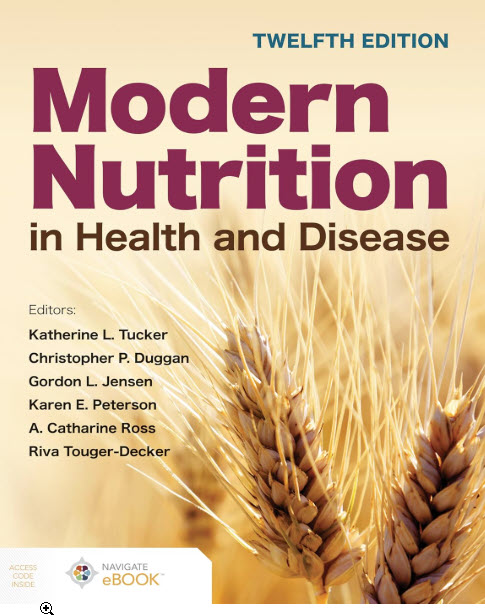 Naturopathic colleges teach that approach. It is all about the ounce of prevention worth more than a pound of cure. Mainly when the cure is designed to manage the symptoms with questionable drugs and not address the real cause of the disease. Recently, intelligent whistleblowers have been speaking out against the other big-money maker product, vaccines! It is, particularly now, a significant risk as more M.D.s are realizing how damaging vaccines can be. Nowadays, it is essential that parents, particularly mothers, research the reasons for any vaccines and how they are determined to be safe before allowing their children to be vaccinated.
Naturopathic colleges teach that approach. It is all about the ounce of prevention worth more than a pound of cure. Mainly when the cure is designed to manage the symptoms with questionable drugs and not address the real cause of the disease. Recently, intelligent whistleblowers have been speaking out against the other big-money maker product, vaccines! It is, particularly now, a significant risk as more M.D.s are realizing how damaging vaccines can be. Nowadays, it is essential that parents, particularly mothers, research the reasons for any vaccines and how they are determined to be safe before allowing their children to be vaccinated.
Not convinced? Here is a refreshing, well-researched article by a West Point graduate and former army officer. Now, with Codex Alimentarius, Big Pharma is trying to make it illegal for a physician to practice proven alternative therapies to heal the body and/or prevent the disease in the first place. Call me if you wish to explore proven solutions to achieve optimal health for your family. It’s not “rocket science”. Eric Goodhart
Future Docs Are Confused, Too
Struggling to understand the national debate over health care? You’re not alone — your future doctor may be baffled, too.
A study published in the September issue of Academic Medicine found that nearly half of all medical students believe they have been inadequately educated about the “practice of medicine” — especially related to medical economics.
Our patients expect us to understand the system, said Matthew M. Davis, one of the researchers and an associate professor of pediatrics and internal medicine in the Child Health Evaluation and Research Unit at the University of Michigan’s medical school. If we don’t, that can result in poor patient care. And if we don’t expect doctors to understand the healthcare system, who will?
The study, by Davis and two colleagues at Michigan, examined tens of thousands of survey responses from medical students about the extent and perceived quality of their training in an array of curricular areas, including clinical care and decision-making and the practice of medicine—the latter including health care systems, managed care, and practice management, among other areas. Read more »
It’s Not Just About Getting In 0
 By now, millions of high school seniors across the country have received the news from their colleges. We wish them all the best of success. Spring always brings some surprises, both good and not so good. This year was another tough year. Hopefully, the final decisions that each of them made by May 1 have been carefully thought through.
By now, millions of high school seniors across the country have received the news from their colleges. We wish them all the best of success. Spring always brings some surprises, both good and not so good. This year was another tough year. Hopefully, the final decisions that each of them made by May 1 have been carefully thought through.
Now, seniors will be looking forward to proms, accepted college days at their respective campuses and finals, well, maybe not finals. One of the many questions they will be asked at points along the way and while in college will also be a question that has become harder for students to answer.
It is what do you plan to major in?  For the thousands of students who have not seriously researched the options while in high school (as we advise students) will likely be overwhelmed by the choices, particularly at a university where the choices are ever increasing. Colleges and universities reported nearly 1,650 academic programs to the Department of Education in 2015; 355 were added to the list over the previous 15 years as colleges, to stay competitive and current, adopted new disciplines like forensic psychology, global studies, cyber-forensics and agroecology and all kinds of health sciences disciplines, including Adventure Education and Leadership.
For the thousands of students who have not seriously researched the options while in high school (as we advise students) will likely be overwhelmed by the choices, particularly at a university where the choices are ever increasing. Colleges and universities reported nearly 1,650 academic programs to the Department of Education in 2015; 355 were added to the list over the previous 15 years as colleges, to stay competitive and current, adopted new disciplines like forensic psychology, global studies, cyber-forensics and agroecology and all kinds of health sciences disciplines, including Adventure Education and Leadership.
Graduating with a double (or triple) major, minor or concentration as a way to hedge bets in an uncertain job market has become increasingly popular; the number of bachelors degrees awarded to double majors rose 70 percent between 2001 and 2014, according to the DOE.
Is Getting Into College Easier? 0
Is Getting Into College Easier?
You may have read or heard about how the number of applications have spiked at so-called prestigious colleges around the country. That triggers fear in many households with college bound students. Fear is an often-used emotion to control the actions of people as to what to do (or not do) going forward. Some observers of the college selection process say it is actually easier to get into colleges (even the more competitive ones) than in previous years. Really?
They say that many students do not realize that getting into a good college today is a lot easier, and will become even more so in the coming years. That is the case, according to the Hechinger Report. The writers of the report say it is important to let go of the “fear” mindset because they claim it is one of the reasons why students do not bother to apply to more competitive colleges. Instead, they settle for lower quality schools, when they could have been accepted to much better institutions.
Actually, that is not the case with the students we have been guiding over the last 25 years. They are very much focused on the most competitive colleges, often too much so. When their college list begins to take shape, they are often doing it the wrong way from the top down, rather than the bottom up.
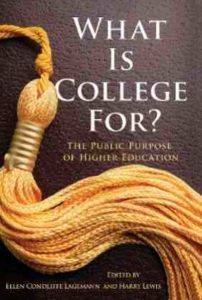 If the reader has college aspirations, you must first think about what is college for and why it is the logical next step for YOU? Though it may become easier to get accepted to college, the same due diligence in finding the colleges best qualified to help you reach your goals is just as important as always. Therefore, even though many colleges and universities may not be that selective, don’t neglect taking the steps that will help you determine if the college to which you apply is qualified to help you reach your goals.
If the reader has college aspirations, you must first think about what is college for and why it is the logical next step for YOU? Though it may become easier to get accepted to college, the same due diligence in finding the colleges best qualified to help you reach your goals is just as important as always. Therefore, even though many colleges and universities may not be that selective, don’t neglect taking the steps that will help you determine if the college to which you apply is qualified to help you reach your goals.
By the way, don’t fall for the well-meaning but misinformed guidance of colleges and some counselors that tell you “Don’t worry about what you want to major in or do for a career. You will have plenty of time to figure that out in college”. If you believe that, read this now.
Yes, it may be easier to get into college in the coming years as there will fewer high school graduates until 2023. We are already seeing college Enrollment Managers conceive ways to not only “fill seats” but with the most revenue/per seat. 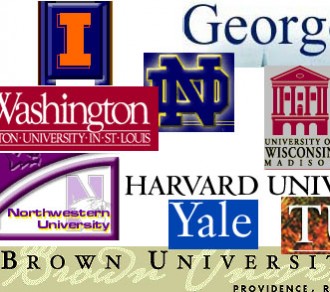 Many colleges and universities will be increasing their marketing efforts to attract these students. Families might get to finally have (dare I say) the negotiating power. That’s because these institutions compete with each other when it comes to the record number of applicants. You may already have seen how colleges encourage everyone to apply without regard to their qualifications. The more applications they get, the more they can reject, thus moving up in the rankings.
Many colleges and universities will be increasing their marketing efforts to attract these students. Families might get to finally have (dare I say) the negotiating power. That’s because these institutions compete with each other when it comes to the record number of applicants. You may already have seen how colleges encourage everyone to apply without regard to their qualifications. The more applications they get, the more they can reject, thus moving up in the rankings.
The National Student Clearinghouse Research Center‘s said that there’s actually going to be more colleges looking for students, so getting into college is not something students should be worried about. But what I say is, they should be worried about how they are going to pay for it. For that and other answers to your questions, call us.
…continuing the Milestone Step 0
Some students go to college knowing exactly what they want to do. But most don’t. At large state universities it is not uncommon that over 75% percent of freshmen, even those who have declared a major, say they are uncertain about their major, and half will change their minds after they declare, sometimes more than once. That is one big reason that only 37% of students graduate in four years.
about their major, and half will change their minds after they declare, sometimes more than once. That is one big reason that only 37% of students graduate in four years.
Colleges and universities have vested interests in students declaring early. Retention rates for declared students are better, and they are more likely to graduate in four years. But college officials also recognize that deciding on a major can be overwhelming, especially when coupled with the fear that a wrong choice will result in added semesters and tuition. Students no longer have the luxury of stumbling into a major or making mistakes, not that they ever did.
This requires thinking ahead. Teenagers are not expected to know what to do with the rest of their lives at age 18, but with coaching they can cover the bases with prudent planning. Some majors have a curriculum that follows a tight sequence of courses. It’s easier to switch out of engineering than it is to take it up later in the college career.
The biggest mistake students make is failing to research what’s required of the major, and the profession. Nursing may sound attractive because a student wants to help people, but nursing students take the same demanding math and science curriculum as premed students, and the work is often technical and not for every kindhearted soul. It is also a similar track with Physical Therapy.
More niche filling additions to the list obviously reflect marketplace trends and student demand, like culinary science/culinology, digital arts and sports communication. At Montclair State University in New Jersey, which offers 300 majors, minors and concentrations, a new fashion studies major has been hugely popular, thanks to the university’s proximity to Manhattan; with Madison Square Garden and Giants Stadium in sight. It also guides the ambitious undergrad toward internship opportunities in a sports industry and event-planning major within its business school.
Still, it’s difficult to predict the employment market. That is why I will encourage students to think outside the  box. In other words if the job doesn’t exist…create one. Many students choose majors they think will lead to jobs, but four years from now freshmen will be applying for jobs that don’t even exist today.
box. In other words if the job doesn’t exist…create one. Many students choose majors they think will lead to jobs, but four years from now freshmen will be applying for jobs that don’t even exist today.
Most employers are looking for transferable skills the ability to problem solve, work collaboratively, write and speak clearly and think critically. These can be developed in any liberal arts discipline. It makes no sense to suffer through a major because you think it will lead to employment.
In the final analysis, wherever a teenager goes and does after high school, which I call Crossing the Gap: Preparing for the Transition, where they go does not matter as much as what they do when they got there.
The late great business philosopher, Jim Rohn, said this “A formal education will make you a living, but self-education will make you a fortune!” These two college graduates understood that. You can too! 1 (978) 820-1295
Fifteen Extraordinary Colleges 0
Five Extraordinary Colleges You’ve Never Heard of until Now
 In our offices we have large North American maps with the locations of most all the colleges in the U.S. and Canada. It is always fun to place a pin into the map where a student of ours matriculated but never knew existed before meeting with us.
In our offices we have large North American maps with the locations of most all the colleges in the U.S. and Canada. It is always fun to place a pin into the map where a student of ours matriculated but never knew existed before meeting with us.
In of the Extraordinary Colleges You Never Heard of Until Now series, Deep Springs College in California was one of those colleges. In my opinion, it was Shimer College in Chicago, one of the most unique colleges in the U.S., to receive a pin. I hope you read the first two installments above if you haven’t already.
As seniors wait to hear from all their colleges to which they applied it is now time for juniors and sophomores to continue the exploratory process. We are going to begin our next college road trip in the beautiful state of Maine in one of the most sought after vacation spots in the Northeast Bar Harbor, Maine, the epitome of New England charm.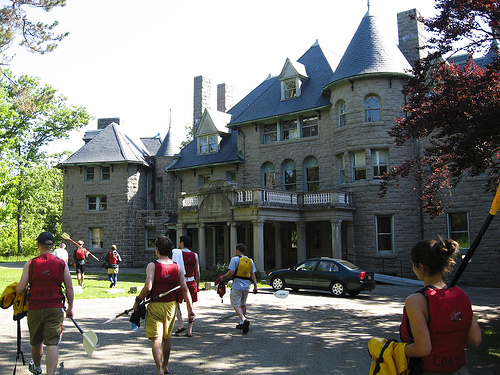
There, smack dab on the Atlantic Ocean you will find The College of The Atlantic. Eat your hearts out Southern California! The beauty and historic significance of the Maine coast puts the boring sun drenched Pacific beaches and ubiquitous shopping centers to shame. Mount Desert Island was a summer escape for wealthy families looking to get away from the heat of the cities. Today, a little Gilded Age charm still exists. A stone castle built in 1895, now acts as College of the Atlantic’s main administrative building, while other homes have been purchased and renovated into residence halls.
 Amazingly, the College’s 350 or so independent, bright, committed and VERY environmentally conscious students consider Acadia National Park as their backyard and personal research laboratory. Ask any one of them what their degree is in and they will tell you Human Ecology! I love that! When you understand what it is, maybe you will too.
Amazingly, the College’s 350 or so independent, bright, committed and VERY environmentally conscious students consider Acadia National Park as their backyard and personal research laboratory. Ask any one of them what their degree is in and they will tell you Human Ecology! I love that! When you understand what it is, maybe you will too.
